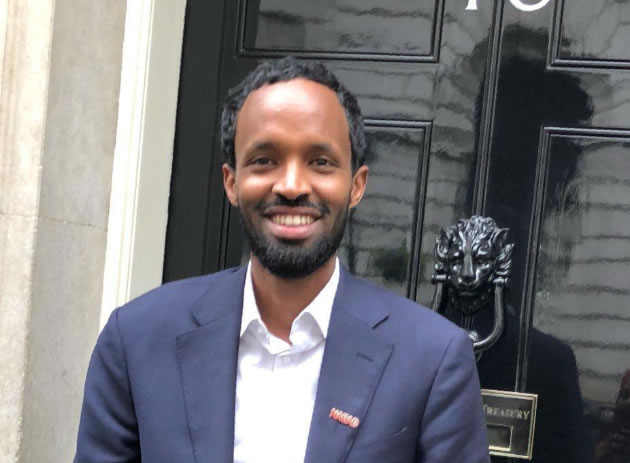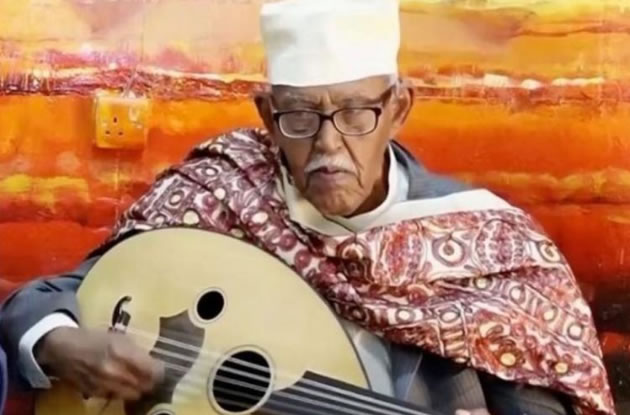Shepherd's Bush Man Calls for Help for Somali Community
Adam Matan says they face disproportionate effects from the pandemic

Adam Matan OBE outside 10 Downing Street
A community champion for UK Somalis has called on schools, councils and the NHS to bring in measures that could ease the plight of thousands of minority-ethnic people during the coronavirus crisis.
Adam Matan OBE from Shepherd’s Bush is fronting a campaign to help Somalis and other (BAME) black and minority-ethnic people. Such communities disproportionately face overcrowded housing, poor economic prospects and language barriers.
West London boroughs such as Ealing and Hammersmith and Fulham have some of the biggest communities of people who have left the East African country since its civil war began in 1991.
Mr Matan, 32, is the managing director of a non-profit organisation, the Anti-Tribalism Movement. It published a report in April which highlighted struggles that many UK Somalis have faced during the outbreak.
“We wanted to reflect what is going on in our community and the fact that all BAME communities are being disproportionately affected by this crisis because of social issues they face,” said Mr Matan.
“We have been speaking to about 3,000 individuals to hear the experiences of Somalis during the COVID crisis, and the report highlights what we’ve heard.”
The report ‘COVID-19 in the Somali Community’ includes estimates that:
- 80 per cent of British Somalis live in social housing with multi-generational families, and without gardens or balconies
- That many families with school-aged children have low access to computers and tablets that are needed for home-learning
- That mothers with several children can feel intimidated from exercising because of past negative experiences with police officers
- That older, first-generation Somalis with limited English have found experiences in hospital disorientating and frightening
Mr Matan was troubled by the experience of famous Somali musician, Ahmed Ismail Hussein, also known as Hudeydi, who died at Charing Cross Hospital.
“He [Mr Hussein] couldn’t understand English or any of the medical jargon, so he wouldn’t understand what doctors were saying.
“We were helping his family communicate as they didn’t have the facilities to provide him with a way of contacting them.”
Mr Matan said Mr Hussein’s family didn’t see him again until after his death, aged 91.
“It was unbelievably sad. We have spoken to a lot of Somali families who have experienced things like this.”
 Ahmed Ismail Hussein, a famous Somali musician died from coronavirus aged 91
Ahmed Ismail Hussein, a famous Somali musician died from coronavirus aged 91
He has called on NHS chiefs to provide technology to help BAME patients stay in touch with their families.
The Anti-Tribalism Movement’s report also called on councils to defer rent payments for tenants in financial trouble.
Mr Matan said: “We have asked councils and social landlords to defer rent payments for families who have lost their jobs. A lot of councils have been offering rent deferrals, but that’s not going to help the people who won’t be able to find several months worth of rent later in the year.”
In a section highlighting the issues that Somali families face with home-schooling during the lockdown, the report called on the Department for Education to “provide extra educational support”, such as laptops, to address inequalities likely to be exacerbated by the shutdown.
The Somali population of the UK is estimated to be between 350,000-500,000 people, up from a 2011 estimate of about 108,000.
Another Somali organisation that contributed to the report, the Friends of Horn Foundation, is trying to record the deaths of every UK Somali man and woman during the pandemic.
The Foundation’s secretary, Abdi Musse, who is based in Lambeth, said: “We are at the early stage of trying to collect data on all the deaths. But when the crisis is over, we intend to share our findings with the Government and Public Health England.
“We are calculating it based on death certificates being issued, where it explicitly says their death was caused by COVID, so we can be sure our figures will be accurate. We need to have our own numbers.”
“We have a network of 57 organisations who are counting deaths in different parts of the country.”
Mr Musse did not wish to share the figures he has collected far.
Public Health England announced on May 4 that it had started a review of every patient in the country who has tested positive for COVID, and will compile data on factors including ethnicity, gender and obesity.
PHE regional director, Professor Kevin Fenton, said: “Having an accurate understanding of how diseases affect different groups of people is a really important issue.
“Increasing evidence and concern around the disproportionate impact of COVID-19 on black and minority ethnic groups highlights an important focus of this review.”
A spokesperson for Imperial College Healthcare NHS Trust, which runs Charing Cross Hospital, said: “We have upgraded our NHS Wi-Fi service to allow for video calls and entertainment streaming services free of charge. We are also in the process of providing our wards with tablet devices for patients to use for virtual visiting if they do not have access their own device.”
Hammersmith and Fulham Council is helping its council tenants set up “payment plans” for rent and is supporting residents with new benefit claims. A spokesperson said: “As a compassionate council we are providing help and support to our tenants on a case by case basis.”
Ealing Council has also been offering discretionary housing payments to some tenants.
Owen Sheppard - Local Democracy Reporter
May 6, 2020